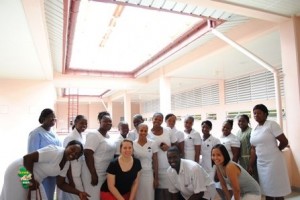
The Guyana Help the Kids (GHTK) continues to make significant strides, as it seeks to reduce neonatal and infant mortality rates in Guyana by 50 per cent. Already, the organisation has assisted in the 50 per cent reduction in neonatal death rate at the Georgetown Public Hospital; some 83 babies were saved.
The GHTK is a Canadian-based charitable organisation led by president and chief of paediatrics at Humber River Hospital in Toronto, Dr Narendra Singh.
During an exclusive interview with Guyana Times International, Singh said the organisation is accelerating a series of healthcare programmes in Guyana in a quest to fulfil its objective.
With major emphasis placed on capacity building, the GHTK is providing comprehensive education to local physicians, nurses and other allied healthcare professionals.
Additionally, it continues to secure specialised equipment to raise the bar of neonatal care in the country.

The GHTK collaborated with the Georgetown Public Hospital Corporation’s Institute of Health Science Education, the University of Guyana, the McMasters University and the Humber River Regional Hospital in Toronto to introduce a paediatric post-graduate residency programme in 2011.
Earlier this year, Dr Clive Bowman and Dr Seepersaud Chatterdeo were the first to graduate with a master’s degree in paediatrics under the programme.
High standard
“The examiner, who came from the Royal College of Physicians and Surgeons of Canada, felt that the two paediatricians can function independently at a very high standard in Canada and the U.S., so I think it gives some support to the quality of the programme we are providing here,” Dr Singh noted.
Meanwhile, the other doctors in training are utilising the services of specialists from the University of Toronto, McMasters University and other universities in North America.
These specialists have been travelling monthly to provide didactic and bedside teaching in keeping with the uniquely developed curriculum.
In addition to the paediatric post-graduate residency programme, the GHTK and Georgetown Public Hospital in March 2012 reconstructed a 24 bed Neonatal Intensive Care Unit (NICU).
The facility at the GPH was brought up to standard with the installation of procure monitors, IV pumps, pump monitors and incubators procured from funds (Cdn$ 100,000) raised by the GHTK. Prior to the commissioning, the unit was in dire need of incubators, a machine which supports the breathing of premature infants while they are still hospitalised, so they can have a better chance of living.
Critical demand
According to Dr Singh, from the more than 15,000 babies born in the country yearly, approximately 6000 are delivered at the Georgetown Public Hospital, hence, it is critical for the hospital to meet the demands of the neonatal and infant population.
With the inclusion of the four regional hospitals: Suddie Public Hospital, the West Demerara Regional Hospital, the Linden Hospital Complex and the New Amsterdam Hospital, approximately 85 per cent of all babies born in a given year was delivered at the central health institutions.
As a result, the GHTK is in the process of incorporating the regional health institutions.
“If we want to impact neonatal mortality in the country, we have to ensure that all babies that are born in Guyana have access to the best possible service, so we are expanding our programme,” Dr Singh said.
According to him, the GHTK has opened a NICU in Linden and New Amsterdam and has provided essential pieces of equipment.
Meanwhile, a feasibility study is being conducted at the Suddie Public Hospital.
The GHTK is hoping to commission the facility at Suddie in March 2014 and similarly a unit at the West Demerara Regional Hospital by August 2014.
Medical practitioners at the various institutions in which NICUs have been installed, are responding positively to this level of development, Dr Singh said.



